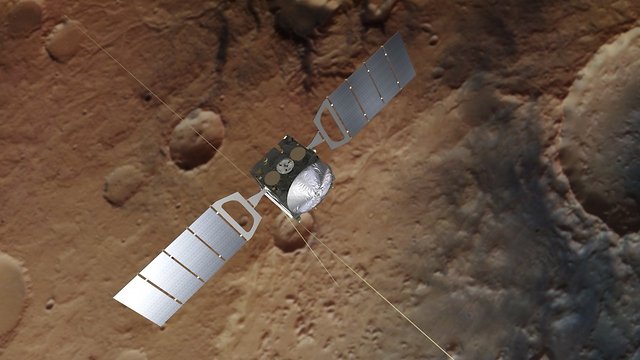Premium Only Content

Scientists Want To Be Sure There's An Underground Lake On Mars
Scientists think they've detected a sub-glacial lake around one of Mars' polar caps, but nobody's actually seen it yet.
Breaking news from the Red Planet! The European Space Agency says it has detected a lake of liquid water below the surface of Mars, raising the possibility that there is - or once was - microbial life on the planet. But even though the agency is pretty sure about the lake, no one has actually seen it - yet.
The European Space Agency, or ESA, announced on 25 July 2018 that radar data collected by the Mars Express spacecraft indicates there is a lake of liquid water buried underneath layers of ice and dust in the south polar region of Mars. It appears to be about 20 kilometers (12.4 miles) wide, according to the radar data.
But despite the groundbreaking findings, no one has actually seen the water yet to be absolutely sure.
Scientists used ground-penetrating radar to send radar pulses towards the surface of Mars, which allowed them to time how long it took for the pulses to be reflected back to the spacecraft, and with what strength. Properties of the material that lies between influences the returned signal, so this can be used to map the subsurface topography, according to ESA.
Additional radar scans will be used to rule out false positives but scientists are also hoping to send a robot to the area in the near future to look for water. The European Space Agency plans to send a rover to Mars in 2020 to search for additional evidence of water or life.
The possibility of liquid water on Mars has been debated for decades, but many scientists have long suspected that liquid water exists at the base of the polar ice caps. The latest discovery is somewhat similar to Lake Vostok, which was discovered about 4 kilometers (2.4 miles) below the ice in Antarctica, here on Earth.
But if you're hoping for little green men on Mars, you're likely to be disappointed. Microbial life is known to thrive in Earth’s subglacial environments, and thus scientists believe that something similar could be happening on Mars - either currently or at some point in the past when the surface of Mars was completely different and more suitable for life.
Until then, whether microbial life exists on Mars remains an open question.
The announcement from the European Space Agency came just months before the Mars Express spacecraft marks its 15th anniversary around the Red Planet. The spacecraft was launched from Kazakhstan on 2 June 2003 and reached its orbit around Mars nearly 7 months later, on 25 December 2003. It is the second-longest surviving spacecraft in orbit around another planet, behind NASA's 2001 Mars Odyssey.
For now, the Mars Express will continue to orbit Mars as many questions about the Red Planet remain unanswered. The European Space Agency's Science Programme Committee decided on 21 March 2018 to continue the spacecraft's operations until the end of 2020, at which point the agency will decide whether to continue operations for another 2 years. It takes about seven-and-a-half hours to complete an orbit around Mars.
-
 3:20
3:20
Newsy
2 years agoRussia suspends only remaining major nuclear treaty with US
7.11K14 -
 1:08
1:08
KNXV
4 years agoASU scientists help with latest mission on Mars
38 -
 4:10
4:10
UFOs and other things Alien in our Solar System
4 years agoEntrances To Underground Alien Bases On Mars Exposed
2.75K5 -
 2:40
2:40
Onn Outsiders News Network
4 years ago $0.04 earnedOnn Underground
648 -
 0:14
0:14
justwalking
4 years ago $0.35 earnedUnderground warehouse
1K2 -
 3:37
3:37
Firesound
4 years agoFiresound - Underground
505 -
 0:31
0:31
ScottysThoughties
4 years agoFemale Scientists
2056 -
 0:20
0:20
KTNV
4 years agoScientists work on a breathalyzer for COVID-19
202 -
 3:23:07
3:23:07
Barry Cunningham
6 hours agoPRESIDENT TRUMP IS BUILDING A NEW MAGA! ARE YOU READY FOR THE NEXT ACT?
61.7K90 -
 2:33:10
2:33:10
Laura Loomer
4 hours agoEP133: GOP Congresswoman Caught Leaking To Qatar
44.6K21